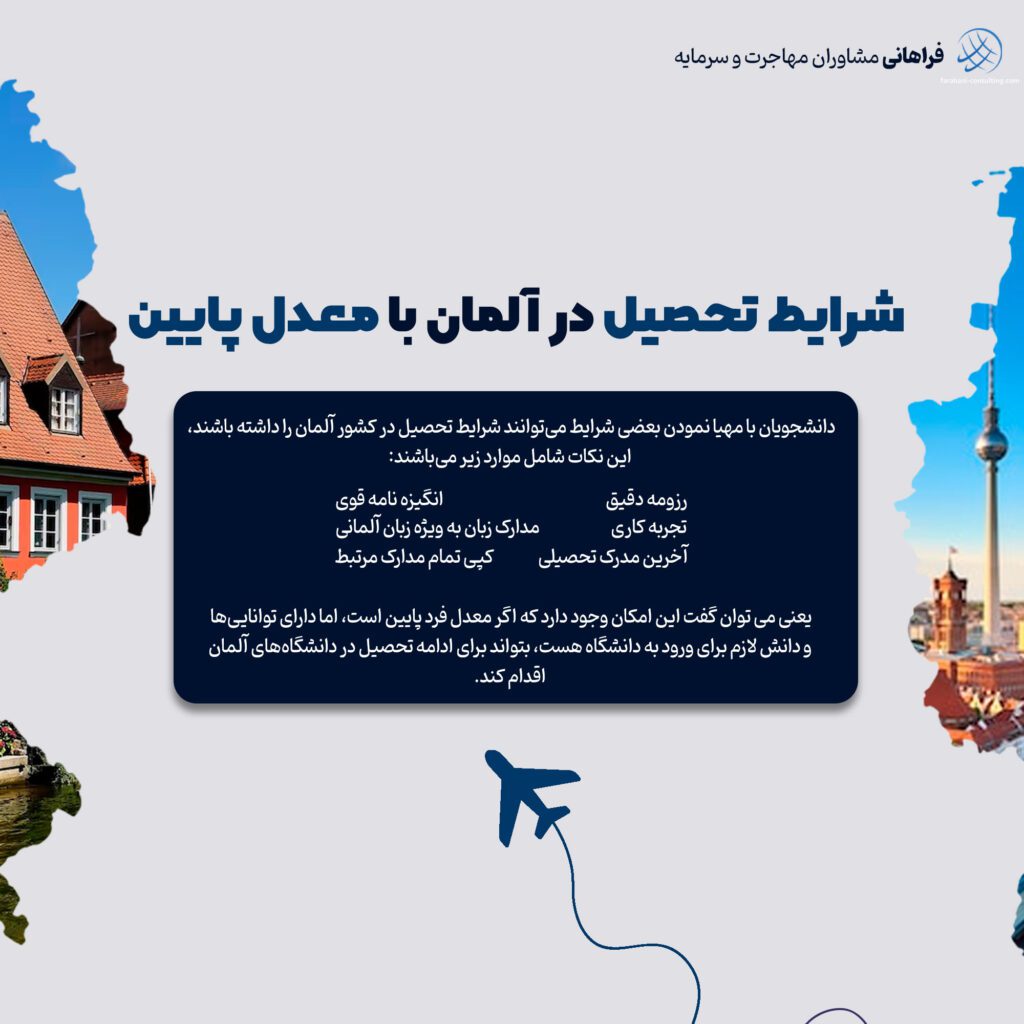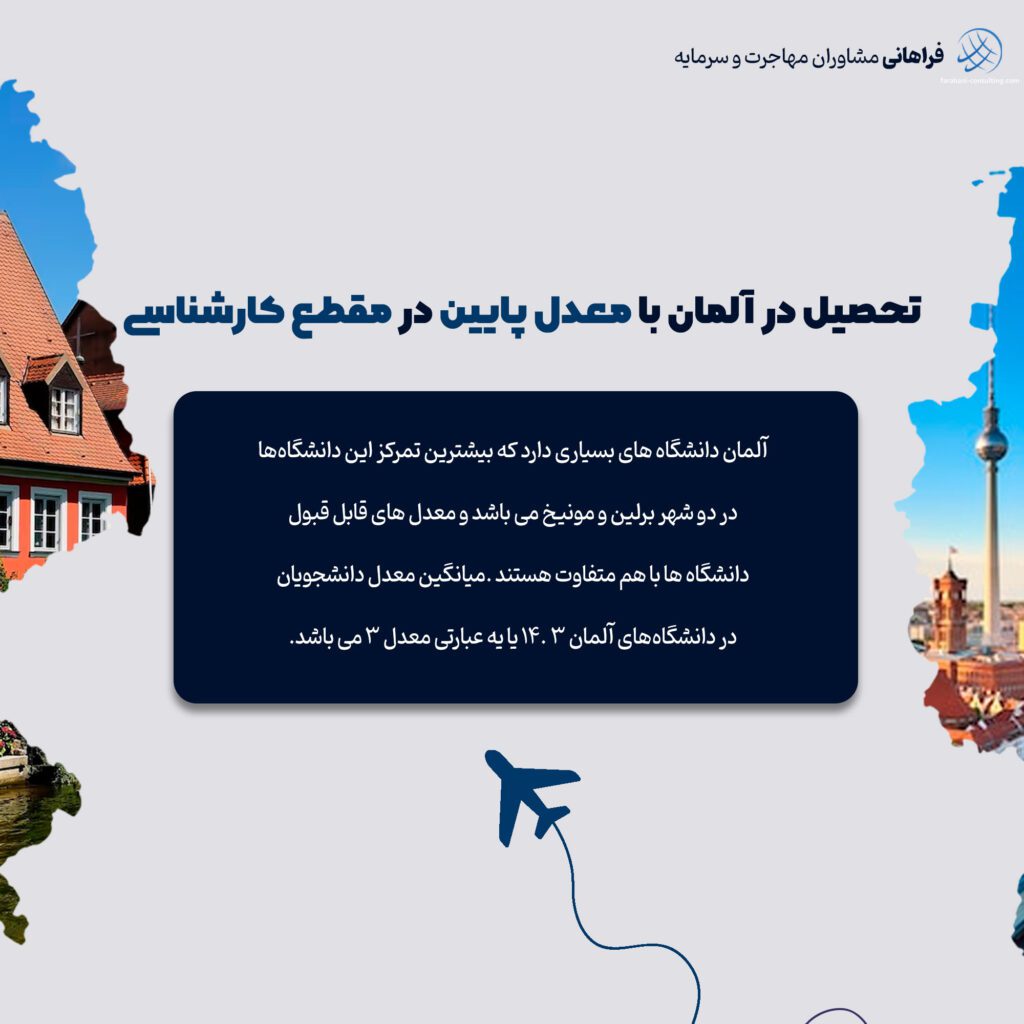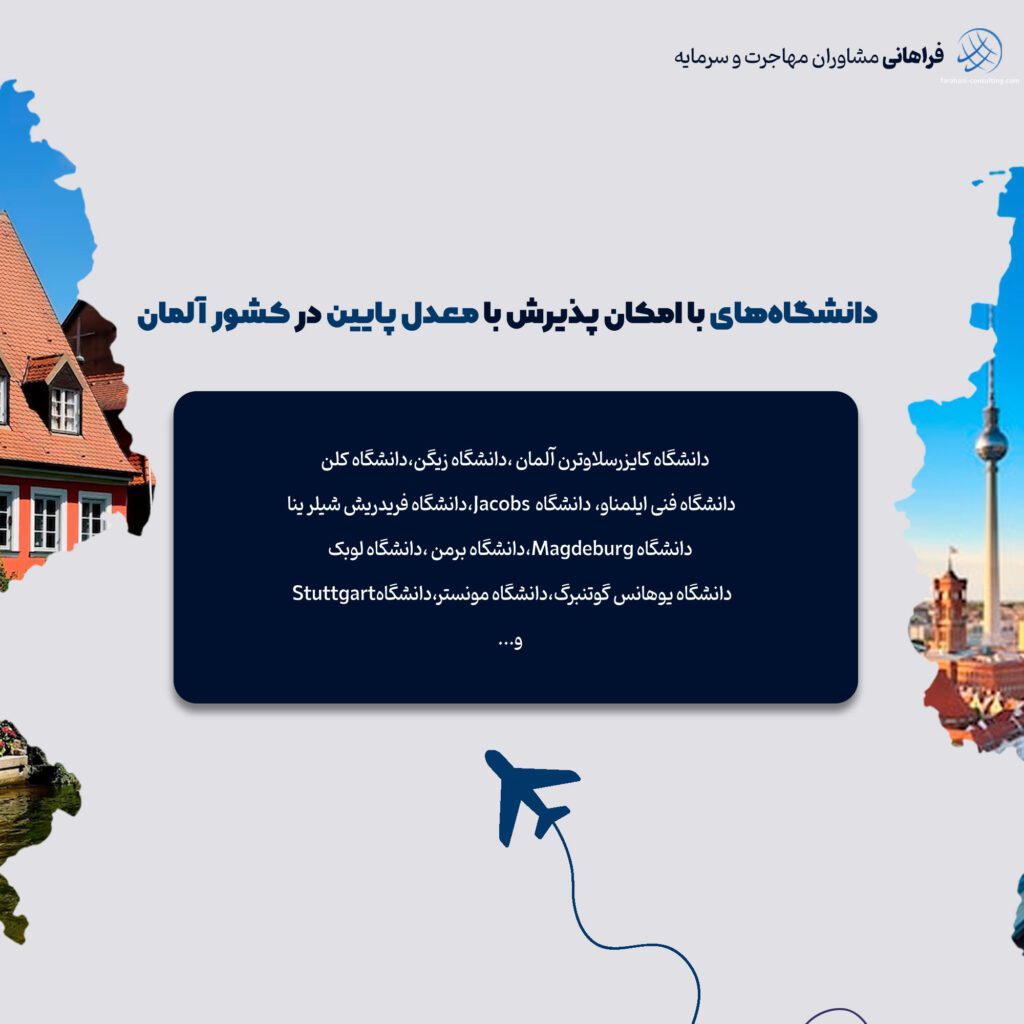اگر معدل کمی دارید و قصد دارید در کشور آلمان درس بخوانید یا مهاجرت تحصیلی به آلمان داشته باشید، اصلاً نگران نباشید چون که جبران این معدل با ارائه بعضی مدارک و اثبات توانایی و مهارتها برای شما امکانپذیر میباشد. بیشتر دانشگاههای کشور آلمان شرایط دریافت پذیرش تحصیلی با معدل پایین را مهیا نموده اند و شما با ثبت تقاضا برای رشتهای مناسب و نیز سپری کردن صحیح مراحل، میتوانید پذیرش خود را اخذ نمایید.
ما در این مقاله در مورد اصلیترین نکات دریافت پذیرش از کشور آلمان با معدل پایین صحبت میکنیم پس تا آخر این مطلب با ما همراه شوید.
شرایط تحصیل در آلمان با معدل پایین

یکی از شرایط تحصیل در کشور آلمان معدل بالای ۱۵ یا به طور تقریبی معادل ۲.۵ در سیستم آموزشی کشور آلمان میباشد ولی اگر کسی معدل پایینتر از این داشته باشد چه کاری باید انجام دهد؟
دانشجویان با مهیا نمودن بعضی شرایط میتوانند شرایط تحصیل در کشور آلمان را داشته باشند، این نکات شامل موارد زیر میباشند:
- رزومه دقیق
- آخرین مدرک تحصیلی
- کپی تمام مدارک مرتبط
- انگیزه نامه قوی
- مدارک زبان به ویژه زبان آلمانی
- تجربه کاری
یعنی می توان گفت این امکان وجود دارد که اگر معدل فرد پایین است، اما دارای تواناییها و دانش لازم برای ورود به دانشگاه هست، بتواند برای ادامه تحصیل در دانشگاههای آلمان اقدام کند.
یکی از راههای تحصیل در آلمان با معدل پایین شرکت در آزمون Feststellungsprüfung است که در بسیاری از موارد، برای داوطلبانی که مدرک دبیرستانی معتبر ندارند یا معدل پایینی دارند، برگزار میشود. در این آزمون، دانشجویان باید نشان دهند که دانش و تواناییهای لازم برای ورود به دانشگاه را دارند.
همچنین در آلمان، برخی دانشگاهها دورههای آمادگی برای ورود به دانشگاه برای دانشجویانی که معدل پایینی دارند، ارائه میدهند. در این دورهها، دانشجویان میتوانند مهارتهای خود را بهبود بخشند و به یادگیری موضوعات دانشگاهی بپردازند.
شرایط معدل برای پذیرش تحصیلی در آلمان
اگر در دانشگاه آزاد تحصیل میکنید یا هنوز موفق به گرفتن مدرک دانشگاهی نشدهاید، دانشگاه به شما مدرکی تحت عنوان فرمهای ۲ و ۳ به منظور ثابت کردن تحصیل شما در دانشگاه تحویل میدهد. خوب است بدانید این مدرکها قابل ترجمه شدن میباشند این فرمها تنها یک مشکل دارند که آن نبود معدل کل در آنها میباشد که از طرف دانشگاههای آلمان مورد قبول نیست.
معدل در کارنامه چیست؟
میانگین تمامی درسها و نمرات شما در یک سال تحصیلی معدل میباشد. معدل مقطع دیپلم، میانگین نمرات درسهای سه پایه دبیرستان میباشد.
در کارنامه دیپلم همه اشخاص، دو نوع معدل کتبی و معدل کل ثبت شده است. جمع معدل کلی سه پایه مقطع دبیرستان، معدل کل میباشد. در مدرک دیپلم، معدل مقطع سوم دبیرستان نیز وجود دارد که از جمع معدل کتبی شما با نمرههای شفاهی، نمره ورزش و انضباط و غیره به دست میآید.
معدل کل برای دانشگاهها و دانشکدههای کشور آلمان اهمیت بیشتری دارد و معیار مهم برای پذیرش و سنجش تحصیلی اشخاص میباشد. در حالت کلی معدل کل از معدل هر سه پایه تحصیلی شما در دبیرستان بیشتر میباشد.
شیوه نمرهدهی در آلمان
نمرهدهی در آلمان طبق سیستم تعریف شده در این کشور از 1 الی 5 میباشد و کسانی که به کسب نمره 1 موفق میشوند، یعنی بالاترین سطح نمره را دریافت نمودهاند. در صورتی که بخواهیم این سیستم نمرهدهی را با سیستمهای تعریفشده در کشورهای اروپایی دیگر مقایسه کنیم، باید بگوییم که نمره 1 معادل A یا A+ بوده و نمره 5 معادل F میباشد.
تحصیل در آلمان با معدل پایین در مقطع کارشناسی

تحصیل در آلمان با معدل پایین در مقطع کارشناسی هم امکان پذیر است، اما علاقه مندان به تحصیل در مقطع کارشناسی در آلمان باید از شرط معدل لازم برای تحصیل در دانشگاه های آلمان اطلاع کامل داشته باشند. آلمان دانشگاه های بسیاری دارد که بیشترین تمرکز این دانشگاهها در دو شهر برلین و مونیخ می باشد و معدل های قابل قبول دانشگاه ها با هم متفاوت هستند .میانگین معدل دانشجویان در دانشگاههای آلمان ۳ .۱۴ یا یه عبارتی معدل 3 می باشد.
در این جا ابتدا انواع دانشگاه های آلمان و نکات پیرامون آن ها را بررسی می کنیم.
نکته 1) در آلمان دو نوع دانشگاه وجود دارد. 1) خصوصی 2) عمومی.
- کیفیت آموزش و امکانات در دانشگاههای خصوصی خوب هست ولی شهریه بسیار گرانی دارند. و بر خلاف آن دانشگاههای دولتی رایگان هستند و بدون هزینه تحصیل و با زبان انگلیسی می توان آموزش دید.
پس برای تحصیل در آلمان با معدل پایین، بهتر است که به فکر دانشگاههای خصوصی نبود، چرا که با پرداخت همان هزینه در دانشگاه کشورهای بهتر مثل ایالت متحده آمریکا میتوان مشغول به تحصیل شد.
نکته 2) دانشگاههای دولتی آلمان نیز به دو دسته تقسیم میشوند.
● دانشگاههای فنی (دانشگاه های TU)
● دانشگاههای علمی کاربردی (Hochschule)
- برای پذیرش در دانشگاههای فنی به معدل و نمره CGPA بالایی نیاز دارید. اگر میخواهید در دانشگاههای فنی آلمان پذیرش بگیرید، حداقل 3.2 یا 3.3 مورد نیاز است. دانشجویان بین المللی برای تحصیل دوره کارشناسی در آلمان در دانشگاه های دولتی، دارای معدل سطح بالایی باشند. حداقل معدل مشخص شده برای مدرک دیپلم جهت دریافت پذیرش دوره کارشناسی، معدل 15 است.
- اگر CGPA کمتر از 3.2 و از (2.7 تا 3.2) دارید، باید به دنبال دانشگاههای Hochschule معروف به دانشگاه علوم کاربردی باشید. پذیرش در این دانشگاهها در مقایسه با دانشگاههای فنی سادهتر است.
- اگر CGPA کمتر از (2.7) دارید، بدیهی است که شانس کمتری برای پذیرش در دانشگاههای با رتبه برتر و در شهرهای بزرگ مانند دانشگاههای TU وجود خواهد داشت. در این صورت به شهرهای کوچکتر آلمان بروید. برای آن دسته از دانشگاههایی که در شهرهای کوچکتر هستند درخواست دهید؛ چرا که رقابت کمتری وجود خواهد داشت.
برای تحصیل مقطع کارشناسی آلمان میتوان از طریق دو روش اقدام کرد.
اگر دیپلم ۱۲ ساله داشته باشید، میتوانید با اخذ پذیرش از کالجهای آلمان بعد از گذراندن دوترم کالج و شرکت در آزمون FSP امکان ورود به دانشگاه و رشته موردنظر خود را دریافت کنید.
در روش دوم فرد متقاضی میتواند بعد از گذراندن دو ترم از رشته دانشگاهی خود در دانشگاههای سراسری ایران یا به عبارتی بعد از گذراندن ۳۵ واحد در دانشگاههای سراسری ایران، در رشته خود درخواست پذیرش از دانشگاههای آلمان را داشته باشد. با حداقل معدل ۱۳، پذیرش در دانشگاههای آلمان امکان پذیر است.
تحصیل پزشکی در آلمان با معدل پایین
انتخاب کردنرشته پزشکی برای تحصیل در آلمان با معدل پایین، رسیک بالایی دارد. به خاطر رقابت بالا برای تحصیل در این رشته، معمولا دانشجویانی که معدلی در بازه 1 الی 1.3 دارند قادر هستند از دانشگاههای آلمان پذیرش بگیرند ولی اگر دارای معدل پایینی باشند، نگران نباشید. شما با فراهم نمودن بعضی از شرایط قادر خواهید بود پایین بودن معدل خود را جبران نمایید. برخی از این شرایط شامل موارد زیر میباشند:
- داشتن سابقه کاری
- شرکت در برنامههای داوطلبانه
- مدارک معتبر زبان
- گذراندن دورههای کارآموزی
راه و روشهای جبران معدل پایین برای گرفتن پذیرش در آلمان
شیوههایی برای جبران معدل پایین وجود دارند و عبارتند از اینکه شما بر اساس پیشینه تحصیل، رزومه تحصیلی، داشتن مدارکی همچون مدرک GRE یا مدرک زبان با نمره بیشتر و داشتن پیشینه پژوهش میتوانید دانشگاه را متقاعد سازید که آدم مناسب برای گرفتن پذیرش دانشگاههای آلمان میباشید.
دانشگاه های بدون شرط معدل آلمان (دانشگاههای با امکان پذیرش با معدل پایین در کشور آلمان)

تعداد زیادی از دانشگاههای کشور آلمان، معدل پایین را قبول نمیکنند و برای پذیرش دانشجویان شرط معدل را ضروری و مهم میدانند، ولی دانشگاههایی وجود دارند که شما میتوانید با وجود معدل کم، موفق به اخذ پذیرش در آنها شویید، چرا که مواردی همچون مهارت در سطح بالای زبان آلمانی، تخصص در زمینه رشته مدنظر، سوابق تحصیلی قدرتمند، تجارب کاری در حیطه رشته تحصیلی برای آنها اهمیت بیشتری دارد.
تعداد این دانشگاهها به فهرست زیر ختم نمیگردد، ولی این فهرست تعدادی از دانشگاههای پیشنهادی با شانس گرفتن پذیرش با معدل پایین در کشور آلمان هستند:
| دانشگاه کایزرسلاوترن آلمان | دانشگاه زیگن | دانشگاه کلن |
| دانشگاه فنی ایلمناو | دانشگاه Jacobs | دانشگاه فریدریش شیلر ینا |
| دانشگاه برمن | دانشگاه Magdeburg | دانشگاه لوبک |
| دانشگاه یوهانس گوتنبرگ | دانشگاه مونستر | دانشگاه Stuttgart |
| دانشگاه فریدریش-آلکساندر ارلانگن-نورنبرگ | دانشگاه Ulm | Jena TU Darmstadt |
| دانشگاه مانهایم | دانشگاه Frankfurt | دانشگاه Passau |
تحصیل در آلمان بدون مدرک زبان
بعد از سوال درباره تحصیل با معدل پایین، یکی دیگر از سوالات درباره تحصیل در آلمان بدون مدرک زبان است.
باید گفت تسلط نداشتن بر زبان آلمانی برای دانشجویان بینالمللی مانعی برای تحصیل در آلمان نیست. به دلیل این که تعداد بیشتری از موسسات آموزشی در آلمان دورههای رایگان به زبان انگلیسی ارائه می کند. و دوره ها و آزمون هایی وجود دارد که توانایی شما را بسنجد و مهارت های شما را ارتقا دهد.
هزینه تحصیل در آلمان
هزینه تحصیل در آلمان در دانشگاههای دولتی آلمان رایگان است. در صورتی که دارای معدل پایینی هستید و میخواهید رایگان تحصیل کنید، میبایست به دنبال دانشگاههای دولتی که این اجازه را به دانشجویان میدهند، باشید. تحصیل در این دانشگاهها فقط هزینه ثبت نام را برای دانشجویان ملی و بینالمللی در پی خواهد داشت.
مزایای تحصیل در آلمان
با تحصیل در آلمان شما میتوانید از یک سری مزیتها بهرهمند شوید که برخی از این مزیتها عبارتند از:
- امکان تحصیل رایگان در آلمان
- شهریه پایین دانشگاههای خصوصی به نسبت کشورهای آمریکا، کانادا و انگلیس
- قرار داشتن نام اکثر دانشگاههای آلمانی در لیست بهترین دانشگاههای جهان
- دارای هزینه زندگی مقرون به صرفه
- امکان کار پاره وقت موقع تحصیل در آلمان
- امکان تحصیل به زبان انگلیسی در آلمان
- امکان آمدن خانواده دانشجو به آلمان
- امکان داشتن کار تمام وقت با دریافت ویزای همراه
- دریافت اقامت کاری در آلمان بعد از تحصیل
معایب تحصیل در آلمان
در کنار مزیتهای متعددی که برای تحصیل در آلمان ذکر کردیم، معایبی هم وجود دارند که عبارتند از:
- گرفتن فاند با معدل پایین در آلمان آسان نمیباشد.
- تحصیل در آلمان با بروکراسی همراه بوده و این امر بعضی از مراحل اداری اخذ پذیرش را سخت مینماید.
- درست است که امکان تحصیل در آلمان به زبان انگلیسی وجود دارد، برای ارتباط بهتر با مردم در این کشور توصیه میشود زبان آلمانی را یاد بگیرید که این هم کار آسانی نمیباشد!
- بعضی از بهترین دانشگاههای آلمان شرایط پذیرش سختگیرانهای داشته و تحصیل در این دانشگاهها با معدل پایین امکانپذیر نمیباشد.
هزینه زندگی در آلمان
به غیر از هزینه تحصیل، نیاز است که به هزینه زندگی در آلمان هم توجه کنید. با توجه به اینکه شرایط تحصیلی با معدل پایین در آلمان آسان نیست. دقت به این هزینهها و بودجهبندی دقیق از اهمیت زیادی برخوردار است.
در یک تخمین کلی هزینه زندگی در آلمان برای یک فرد را فقط 850 الی 1200 یورو در ماه در نظر گرفتهاند. دقت کنید که این مبلغ با توجه به شهر محل تحصیل دانشجو و همچنین عادتهای زیستی او تغییر مینماید.
سوالات در مورد تحصیل در آلمان با معدل پایین
[rank_math_rich_snippet id=”s-f4385ef4-295c-43d3-bb5c-0219b854f8e2″]

دیدگاه
رها
ژانویه 30, 2024 - 4:25 ب.ظسلام من معدل کارشناسیم 16 هستش اما معدل دیپلم و پیش دانشگاهی زیر 12 یعنی نمی تونم برای ارشد قبول شم؟
milani
ژانویه 30, 2024 - 4:26 ب.ظسلام دوست عزیز
شرایط پذیرش شما بسته به دانشگاه انتخابی شما دارد. شما می توانید برای بررسی شرایط خود از طریق واتس اپ با ما در ارتباط باشید.
راحله
ژانویه 30, 2024 - 4:31 ب.ظسلام
با معدل 17 امکان قبولی در دانشگاههای پزشکی آلمان وجود داره؟
milani
ژانویه 30, 2024 - 4:33 ب.ظسلام دوست عزیز
برای قبولی در رشته پزشکی باید معدل شما بالاتر از 18.5 باشد.